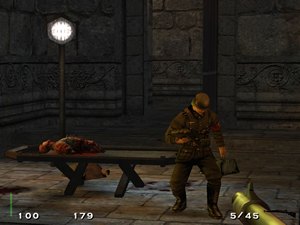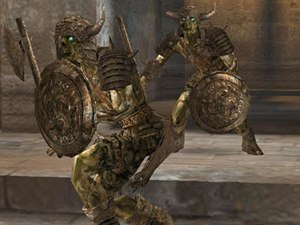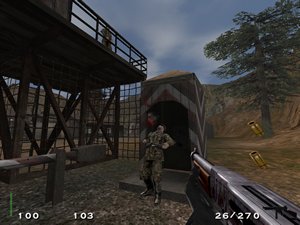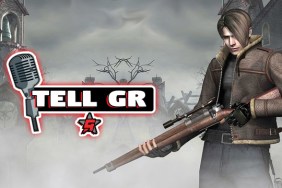Sprechen Sie Zombie?
Some things in life are just perversely ironic. Take this one: when I was growing
up as a nice Jewish boy in California, I had a recurring fantasy that I could
go back in time as the Terminator and kill Hitler, piss on Himmler, and give Albert
Spear a Canadian necktie. I eventually came to think that perhaps conflating the
MTV-generation’s stout unwillingness to accept reality with a healthy dose of
1980’s paranoid action fantasies and Michael J. Fox films was not altogether healthy.
As
this moment of awakening was upon me and I opened my soul to living in truth,
my brother raced into the room and grabbed me off the couch to show me this
new game he got. Minutes later, I was blasting away Nazis with the glee of a
Stormtrooper-massacring Ewok. That was Wolfenstein 3D, the very first
of the first-person shooters.
That was a very long time ago. But it seems that someone else realized that
power of nostalgia because they went ahead and finally made a sequel to Wolfenstein
3D, the aptly titled Return to Castle Wolfenstein. What we’re dealing
with is a good game, a fun game, but strangely a game that, though conceived
of nostalgia, doesn’t have any real sense of where it came from.
You reprise your role as agent BJ Blazkowicz, sent deep into Germany on some
wily scheme by a secretive council of Allied spooks. The alleged plot concerns
a Nazi attempt to resurrect an ancient, evil German warlord-sorcerer-blend-o-matic-something.
Throughout the game, BJ blasts Nazis, Occult Nazis, Robo Nazis, and even Mummy-Robo-Mutant-Brainfeeding-Clawed-Nazis-With-Poor-Hygeine.
This poses a small problem.
Who cares, right? It’s a shooter, there are targets, you shoot them, they
die, you dance, right? But games are trying more and more to feel like action
movies, and movies need good plots…and games need at least buyable ones. Shooting
Robocop’s grandad in 1944 and eviscerating the Evil Dead during WWII tends to
take a player out of their willing suspension of disbelief.
Worse still, Return to Castle Wolfenstein introduces a supernatural
evil that is meant to be even worse than the Nazis. The Nazis are the
ultimate evil, and making them less vile than anything detracts from their impact
and therefore from the fun of shooting them.
Speaking of which, they don’t die like they used to. Mention “Mein Lieben!”
to any self-respecting PC gamer and you’ll get a knowing smile – that’s what
Nazis screamed as you killed them in Wolf 3D. Here, they speak English.
I understand that for story purposes the Nazis often have long conversations
that have to be in English, but why extend it over a beloved gaming hallmark?
This is the main problem with Return to Castle Wolfenstein – it’s so
excited about the ways that is differs from Wolf3D that it sacrifices
its connection to its past.
 But
But
before you get depressed, know that Return to Castle Wolfenstein is not
bad; actually, it’s mostly solid. If you forget about most of the intangibles,
the game does a damn good job of putting you somewhere with a gun and letting
it all rip. The graphics (based on Quake 3 tech)
are extremely good, easily on the bleeding edge, and the level design is detailed
and atmospheric. The weapon selection is good as well, with most of the guns
being true to the period except for the Tesla cannon…oh well… it worked
for Red Alert.
Above all, Return to Castle Wolfenstein has the right feel as a shooter.
The combat is very solid with smart enemy placement and AI that, while not exceptional,
makes for some great gunplay. Most of the time, Return to Castle Wolfenstein
is much like a stripped-down No One Lives
Forever set in WWII and, when it concentrates on being that, succeeds very
well.
What really makes it work, though, is the multiplayer. Instead of the usual
Deathmatch options, Return to Castle Wolfenstein offers a team-based
multiplayer game best described as the meeting of Unreal
Tournament‘s Assault mode and Half-Life’s
Team Fortress. Two teams, Allied and Axis, square off around a fortress, town,
or other installation and each have objectives, usually more complicated than
just attack/defend. Each player picks a role, either a Soldier (can use any
weapon), Medic (can heal dying soldiers), Engineer (can blow up obstacles),
or Lieutenant (carries ammo and can call airstrikes). Once you select your role
and your weapon, you spawn in with that weapon and keep it unless you die and
switch.
This system allows some very intricate strategizing and teamwork. The best
games involve a great deal of communication and coordination; the worst ones
are free-for-all chaos, which is still good fun. The single player and multiplayer
were designed by different developers (Gray Matter and Nerve, respectively),
so there isn’t a lot of cohesion, but neither is hobbled by the other. The multiplayer
alone is worth the price of admission.
But in all, Return to Castle Wolfenstein is not what it could have
been. As a story it’s utterly bizarre, as a sequel it’s sub-par, but as a stand-alone
game it’s very good. The simple truth is that regardless of the detractions,
killing Nazis will always be fun…always. There are few times that you
can play a game and feel you made the world a better place. Wolfenstein 3D
was one of those times. If the world isn’t any better after playing Return
to Castle Wolfenstein, at least it might brighten your day.

-
Killing Nazis!
-
Killing More Nazis!
-
Great Graphics
-
Multiplayer for the ages
-
Killing Zombie Nazis?
-
Great Looking Zombie Nazis?
-
Story for the trash can









